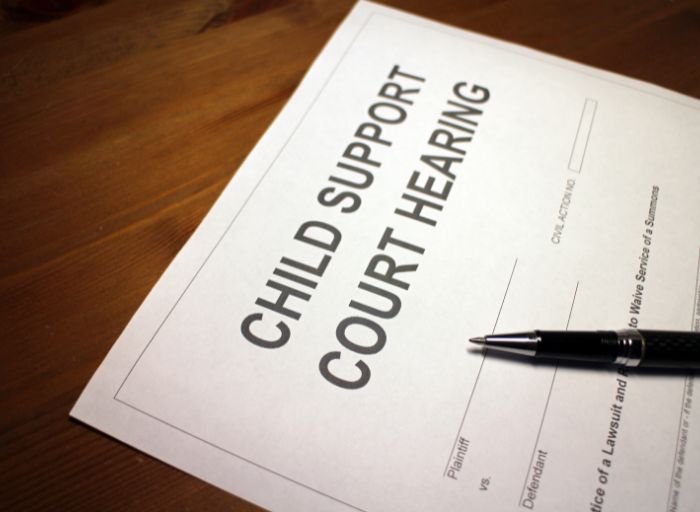The Texas Child Support program is designed to ensure that children receive financial support from both parents, regardless of whether the parents are married, divorced, or separated. Here’s some information on the Texas child support FAQ’s including eligibility requirements, application processes, and frequently asked questions.
Eligibility Requirements for child support in Texas
In Texas, both parents are responsible for providing financial support for their children until they reach the age of 18 or graduate from high school, whichever comes later. If a child has a disability, the parents may be required to provide support beyond the age of 18. To be eligible for the Texas Child Support program, one parent must have custody of the child, and the other parent must be obligated to pay child support.

Application Process for Texas Child Support Program
First, the main FAQ about Texas child support is how to apply. To apply for child support services in Texas, one parent can visit the Office of the Attorney General’s Child Support Division website or call the customer service hotline. The application process includes providing information about the child, the parents, and any court orders that pertain to child support. Once the application is complete, the Child Support Division will initiate a case and send a notice to the non-custodial parent.
READ | Texas child support system: everything you need to know
The Texas Child Support program is a government program designed to ensure that children receive financial support from both parents, regardless of whether the parents are married or divorced. Child support can be ordered by a court or agreed to by the parents and can be used to pay for the child’s basic needs, such as food, clothing, and shelter, as well as medical care, education, and other expenses.
Eligibility for the Texas Child Support program is based on several factors, including the child’s age, the income of both parents, and the custody arrangement. Generally, child support is ordered until the child turns 18 or graduates from high school, whichever comes later.

To apply for child support in Texas, the custodial parent (the parent who has primary custody of the child) can fill out an application online or in person at a local child support office. The application will require information about both parents, including income, employment, and contact information. The application is perhaps the most important step in the process.
Once the application is submitted, the child support office will establish paternity (if necessary), calculate the amount of child support to be paid, and establish a court order or agreement for payment. Child support payments can be made through wage withholding, direct deposit, or by mail.
Overall, the Texas Child Support program is an important resource for families to ensure that children receive the financial support they need to thrive. If you have questions or need assistance with child support in Texas, you can contact your local child support office or visit the Texas Child Support website for more information.
READ | Texas Child Support System: Everything you need to know
How is child support calculated in Texas?
The most critical FAQ about Child support in Texas. It is calculated based on the Texas Child Support Guidelines, which take into account several factors, including the income of both parents, the number of children, and the amount of time the non-custodial parent (the parent who does not have primary custody of the child) spends with the child.
The basic formula for calculating child support in Texas is as follows:
Determine the monthly net resources of the non-custodial parent. This includes all sources of income, including wages, salary, bonuses, commissions, self-employment income, and investment income, minus certain deductions such as taxes, Social Security, and Medicare.
Multiply the non-custodial parent’s monthly net resources by a percentage based on the number of children:
20% for one child
25% for two children
30% for three children
35% for four children
40% for five or more children
Adjust the percentage based on the amount of time the non-custodial parent spends with the child. For example, if the non-custodial parent has the child for at least 30% of the time, the percentage may be reduced.
Add any additional expenses, such as health insurance or child care costs, to the basic child support amount.
Once the child support amount is calculated, it is established through a court order or agreement between the parents. The non-custodial parent is then required to make regular child support payments to the custodial parent to help cover the child’s expenses.
It’s important to note that child support calculations can be complex and may vary depending on the circumstances of each case. If you have questions or need assistance with child support in Texas, you can contact your local child support office or consult with a family law attorney.
What happens if the custodial parent remarries or has additional children?
A common FAQ about the Texas child support system is about the parent having more kids. If the custodial parent in Texas remarries or has additional children, it does not directly affect the child support obligations of the non-custodial parent. The non-custodial parent is still required to make child support payments based on the guidelines and the factors that were in place at the time the child support order was established or modified.
However, the custodial parent’s remarriage or additional children may be considered a material and substantial change in circumstances, which could provide grounds for the non-custodial parent to seek a modification of the child support order. In other words, the non-custodial parent may be able to request that the child support obligation be modified based on the new circumstances.
To modify a child support order in Texas, the requesting party must file a petition with the court and demonstrate a material and substantial change in circumstances that justifies the modification. The court will consider various factors, including the income of both parents, the needs of the child, and any other relevant circumstances.
It’s important to note that any modification of a child support order must be approved by the court. Until a modification is granted, the existing child support order remains in effect and the non-custodial parent must continue to make payments according to that order.
What happens if a parent fails to pay child support?
If a parent fails to pay child support in Texas, there are several enforcement mechanisms that can be used to collect the past-due payments. Here are some of the possible consequences for non-payment of child support in Texas:
1. Wage Withholding: The most common method of collecting child support payments in Texas is through wage withholding. This means that the child support payments are deducted directly from the non-custodial parent’s paycheck by their employer.
2. License Suspension: If a parent falls behind on child support payments, the state of Texas can suspend their driver’s license, professional license, and even their hunting or fishing license until the payments are brought up to date.
3. Intercepting Tax Refunds: The state of Texas can intercept federal and state tax refunds to pay back child support arrears.
4. Property Liens: If the non-custodial parent owns real estate or other property, a lien can be placed on that property to secure payment of past-due child support.
5. Contempt of Court: If a parent fails to comply with a court order to pay child support, they can be held in contempt of court, which can result in fines and even jail time.
6. Seizure of Assets: If a parent has assets such as a car, boat, or other valuable property, those assets can be seized and sold to pay back child support arrears.
It’s important to note that the non-custodial parent still owes the child support payments even if enforcement actions are taken against them. Interest may also be charged on the past-due amount.
Can child support be modified if there is a change in circumstances?
Yes, child support can be modified in Texas if there is a significant change in circumstances that justifies a modification. A modification may be necessary if there has been a significant change in the income of one or both parents, a change in the child’s needs or expenses, a change in custody arrangements, or other factors that impact the amount of child support that should be paid.
In Texas, either parent can request a modification of a child support order. To request a modification, the parent must file a petition with the court that issued the original child support order. The petition must include information about the change in circumstances and the reasons why the modification is necessary.
If both parents agree to the modification, they can submit a written agreement to the court for approval. If there is no agreement, the court will hold a hearing to consider the request for modification. The court will consider various factors, such as the income of both parents, the child’s needs, and any other relevant circumstances.
It’s important to note that until a modification is approved by the court, the existing child support order remains in effect and the non-custodial parent must continue to make payments according to that order. Additionally, a modification can only be applied retroactively to the date that the petition was filed, not to the date that the change in circumstances occurred.
Can child support be enforced across state lines?
Yes, child support can be enforced across state lines in the United States through the Uniform Interstate Family Support Act (UIFSA), which is a law that has been adopted by all 50 states, the District of Columbia, and the U.S. territories.
Under UIFSA, if the custodial parent and the child live in a different state than the non-custodial parent, the custodial parent can register the child support order in the state where they live. The state where the order is registered then has the authority to enforce the order and collect payments from the non-custodial parent, even if they live in a different state.
UIFSA also provides for cooperation between states in enforcing child support orders. If the non-custodial parent moves to a different state, the state where the order was originally issued can request assistance from the new state in enforcing the order. The new state must then take action to enforce the order in accordance with its own laws and procedures.
UIFSA also allows for the establishment of new child support orders across state lines. If the custodial parent and child live in a different state than the non-custodial parent, the custodial parent can file a petition in their state to establish a new child support order. The petition will then be sent to the non-custodial parent’s state, which will hold a hearing and issue a new child support order.
Overall, UIFSA provides a framework for enforcing and modifying child support orders across state lines, which helps ensure that children receive the financial support they need regardless of where their parents live.
Can child support services be terminated?
Child support services can be terminated when the child reaches the age of 18 or graduates from high school, whichever comes later, or if the child is emancipated before reaching the age of 18.
Can Texas enforce visitation orders ?
Another FAQ about Texas child support is about enforcing child visitation. This is a question frequently asked of Texas Child Support Agency. The answer is no. They cannot enforce visitation. However, if you are experiencing a problem, call the visitation hotline at 866-292-4636.
What are the eligibility requirements for receiving child support in Texas?
In order to be eligible to receive child support in Texas, you must be the legal parent or guardian of the child, or the court-appointed conservator of the child. Additionally, the child must be a resident of the state.
How do I go about applying for child support in Texas?
To apply for child support in Texas, you must complete an application with the Texas Attorney General’s Office. You can apply online or by mail.
What is the process for modifying Child Support in Texas?
If you would like to modify an existing child support order in Texas, you must first file a motion with the court that issued the child support order. The court will then consider your motion and issue a ruling.
How long does it take to process a child support application in Texas?
The time it takes to process a child support application in Texas will vary depending on the complexity of the case. Generally, it can take up to 90 days to process an application.
Is there a fee to apply for child support in Texas?
There is no fee to apply for child support in Texas.
How can I check the status of my child support application in Texas?
You can check the status of your child support application in Texas by visiting the Texas Attorney General’s website or by calling their office.
What is the maximum amount of child support I can receive in Texas?
The maximum amount of child support that a parent may receive in Texas depends on the income of both parents and the number of children involved. Generally, courts are required to follow state guidelines for determining appropriate amounts of child support. To calculate an estimate of what you might be entitled to in child support payments, you can use the online child support calculator provided by the Texas Attorney General’s office.
Can I file a complaint if my child support payments are not being made?
Yes, you can file a complaint with the Texas Attorney General’s Office if you are not receiving the child support payments to which you are entitled.
What happens if I cannot afford to pay my child support payments?
If you are having difficulty paying your child support payments, you should contact the Texas Attorney General’s Office. They can work with you to make a payment plan that is affordable and manageable.
Does the Texas Attorney General offer any resources to help parents with child support issues?
Yes, the Texas Attorney General’s Office offers a variety of resources to help parents with child support issues. These include an online child support calculator, information about the child support process, and access to legal assistance. The Texas Attorney General also provides a toll-free hotline to help parents find answers to their questions. Additionally, they offer educational materials and online forms to help parents with their child support issues.
Are there other resources available in Texas for parents who are struggling with child support payments?
Yes, there are many resources available in Texas to help parents who are struggling with child support payments. The Texas Department of Family and Protective Services has several programs that can provide assistance, such as Temporary Assistance for Needy Families (TANF), the Child Care Assistance Program (CCAP), the Parent Education and Incentive Program (PEIP) and more. Additionally, there are local agencies and non-profit organizations that offer services such as legal assistance, financial counseling, and other resources to help parents struggling with child support payments. Contact your local county clerk or a family law attorney for more information.
Conclusion
Texas has a variety of options for child support payments and enforcement. Depending on the situation, parents have different options from creating an agreement without going to court or filing with the court for a ruling. When creating an agreement there are many factors to consider such as income, number of children, and other living expenses. It is important to read through all available information to ensure that everyone is making the best possible decision for their family.
Overall, understanding Texas child support laws and regulations can be complex but helpful in finding the right solution for your family. With a range of payment options available, it is crucial to research and talk with both parties involved in order to make sure all expectations are being met.
